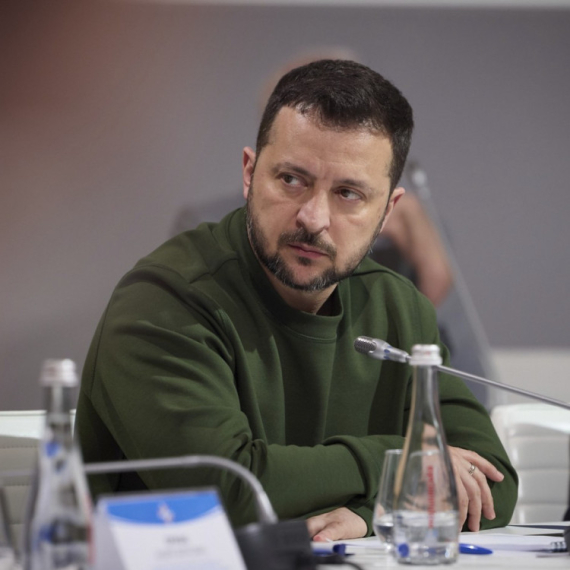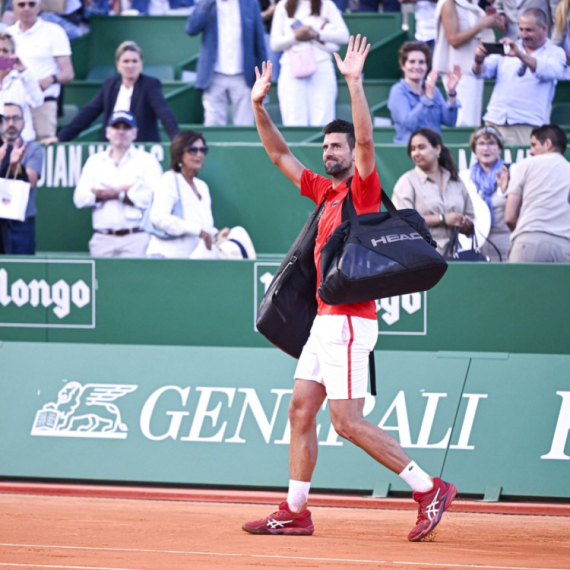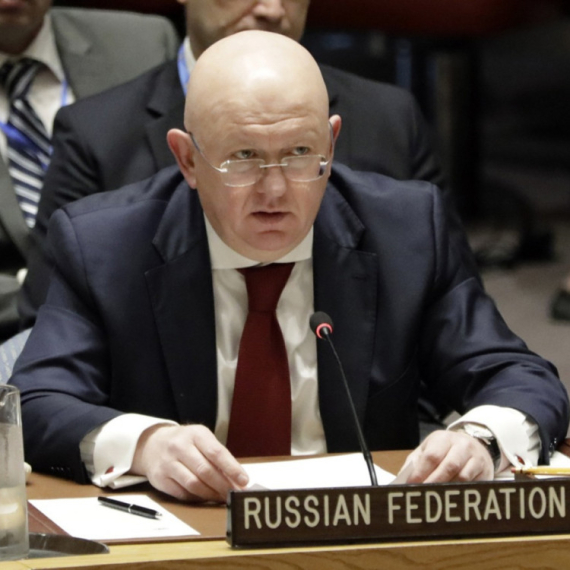Climate deal sealed by U.S. U-turn
Delegates at the UN summit in Bali have agreed a deal on curbing climate change after days of bitter wrangling.
Saturday, 15.12.2007.
09:44

Delegates at the UN summit in Bali have agreed a deal on curbing climate change after days of bitter wrangling. Agreement was reached after a U-turn from the U.S., which had wanted firmer commitments from developing countries. Climate deal sealed by U.S. U-turn Earlier, the EU and US agreed that industrialized countries would not set firm emissions targets at this stage. The "Bali roadmap" initiates a two-year process of negotiations designed to agree a new set of emissions targets to replace those in the Kyoto Protocol. "I think we have come a long way here," said Paula Dobriansky, head of the U.S. delegation. "In this, the United States is very committed to this effort and just wants to really ensure we all act together." Dramatic scenes The U.S. acceptance came just minutes after it had signalled it would reject the compromise, a statement that drew boos from delegates in the conference hall. The EU had earlier thrashed out the compromise text with developing countries including China. They had complained that language on reducing their emissions was too strong, and would commit them to measures that could retard their economic development. They also wanted the West to pledge more action on transferring clean technology to developing societies. Observers spoke of emotional scenes in the conference hall - the UN's top climate official Yvo de Boer in tears after being accused by China of procedural irregularities, and cheers and hugs when the U.S. indicated its acceptance. "This is a real breakthrough, a real opportunity for the international community to successfully fight climate change," said Indonesian Environment Minister Rachmat Witoelar, who served as conference president. "Parties have recognized the urgency of action on climate change and have now provided the political response to what scientists have been telling us is needed." Talks have been intense, and the meeting has run more than a day beyond its scheduled close, with several night-time sessions. On the road The document coming out of the meeting, the "Bali roadmap", contains text on emissions cuts, the transfer of clean technology to developing countries, halting deforestation and helping poorer nations protect their economies and societies against impacts of climate change such as rising sea levels and falling crop yields. The roadmap sets the parameters and aims for a further set of negotiations to be finalised by the 2009 UN climate conference, to be held in Denmark. By that stage, parties to the UN Framework Convention on Climate Change (UNFCCC) and Kyoto Protocol should have agreed a comprehensive plan for curbing global warming and adapting to its impacts. This will include firm emissions targets for industrialized countries to replace those in the Kyoto Protocol which expire in 2012, some softer form of targets or ambitions for major developing countries, and mechanisms for leveraging funds from carbon trading to protect forests and fund adaptation projects. The EU came to the talks demanding that industrialized nations commit to cuts of 25-40% by 2020, a bid that was implacably opposed by a bloc containing the U.S., Canada and Japan. This dispute was resolved with a text that did not mention specific emissions targets but did acknowledge that "deep cuts in global emissions will be required to achieve the ultimate objective". Environmental groups and some delegates have criticized the draft as being weak and a missed opportunity. France's Deputy Ecology Minister Nathalie Kosciusko-Morizet acknowledged the deal amounted to far less than the EU had wanted. But, she told the AFP news agency: "The public can understand that we brought the United States into the negotiations. "It's a framework that is quite weak but which still moves forward." Tree line Earlier, consensus was reached on the principle of rewarding poorer countries to protect their forests. This is widely acknowledged as the cheapest single way of curbing climate change, and brings benefits in other environmental areas such as biodiversity and fresh water conservation. Delegates agreed on a framework that could allow richer nations and companies to earn "carbon credits" by paying for forest protection in developing countries. "We need to find a new mechanism that values standing forests," said Andrew Mitchell, executive director of the Global Canopy Program, an alliance of research institutions. "Ultimately, if this does its job, [deforestation] goes down to nothing." Mitchell said the only feasible source of sufficient funds was a global carbon market. But many economists believe mandatory emissions targets are needed to create a meaningful global market.
Climate deal sealed by U.S. U-turn
Earlier, the EU and US agreed that industrialized countries would not set firm emissions targets at this stage.The "Bali roadmap" initiates a two-year process of negotiations designed to agree a new set of emissions targets to replace those in the Kyoto Protocol.
"I think we have come a long way here," said Paula Dobriansky, head of the U.S. delegation.
"In this, the United States is very committed to this effort and just wants to really ensure we all act together."
Dramatic scenes
The U.S. acceptance came just minutes after it had signalled it would reject the compromise, a statement that drew boos from delegates in the conference hall.The EU had earlier thrashed out the compromise text with developing countries including China.
They had complained that language on reducing their emissions was too strong, and would commit them to measures that could retard their economic development.
They also wanted the West to pledge more action on transferring clean technology to developing societies.
Observers spoke of emotional scenes in the conference hall - the UN's top climate official Yvo de Boer in tears after being accused by China of procedural irregularities, and cheers and hugs when the U.S. indicated its acceptance.
"This is a real breakthrough, a real opportunity for the international community to successfully fight climate change," said Indonesian Environment Minister Rachmat Witoelar, who served as conference president.
"Parties have recognized the urgency of action on climate change and have now provided the political response to what scientists have been telling us is needed."
Talks have been intense, and the meeting has run more than a day beyond its scheduled close, with several night-time sessions.
On the road
The document coming out of the meeting, the "Bali roadmap", contains text on emissions cuts, the transfer of clean technology to developing countries, halting deforestation and helping poorer nations protect their economies and societies against impacts of climate change such as rising sea levels and falling crop yields.The roadmap sets the parameters and aims for a further set of negotiations to be finalised by the 2009 UN climate conference, to be held in Denmark.
By that stage, parties to the UN Framework Convention on Climate Change (UNFCCC) and Kyoto Protocol should have agreed a comprehensive plan for curbing global warming and adapting to its impacts.
This will include firm emissions targets for industrialized countries to replace those in the Kyoto Protocol which expire in 2012, some softer form of targets or ambitions for major developing countries, and mechanisms for leveraging funds from carbon trading to protect forests and fund adaptation projects.
The EU came to the talks demanding that industrialized nations commit to cuts of 25-40% by 2020, a bid that was implacably opposed by a bloc containing the U.S., Canada and Japan.
This dispute was resolved with a text that did not mention specific emissions targets but did acknowledge that "deep cuts in global emissions will be required to achieve the ultimate objective".
Environmental groups and some delegates have criticized the draft as being weak and a missed opportunity.
France's Deputy Ecology Minister Nathalie Kosciusko-Morizet acknowledged the deal amounted to far less than the EU had wanted.
But, she told the AFP news agency: "The public can understand that we brought the United States into the negotiations.
"It's a framework that is quite weak but which still moves forward."
Tree line
Earlier, consensus was reached on the principle of rewarding poorer countries to protect their forests.This is widely acknowledged as the cheapest single way of curbing climate change, and brings benefits in other environmental areas such as biodiversity and fresh water conservation.
Delegates agreed on a framework that could allow richer nations and companies to earn "carbon credits" by paying for forest protection in developing countries.
"We need to find a new mechanism that values standing forests," said Andrew Mitchell, executive director of the Global Canopy Program, an alliance of research institutions.
"Ultimately, if this does its job, [deforestation] goes down to nothing."
Mitchell said the only feasible source of sufficient funds was a global carbon market.
But many economists believe mandatory emissions targets are needed to create a meaningful global market.




































Komentari 0